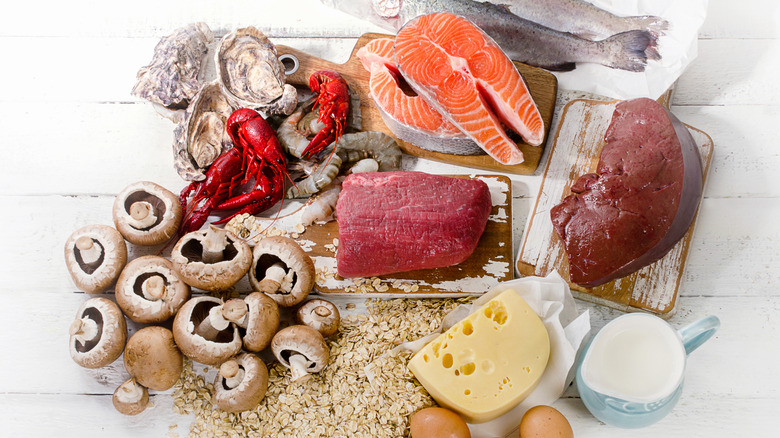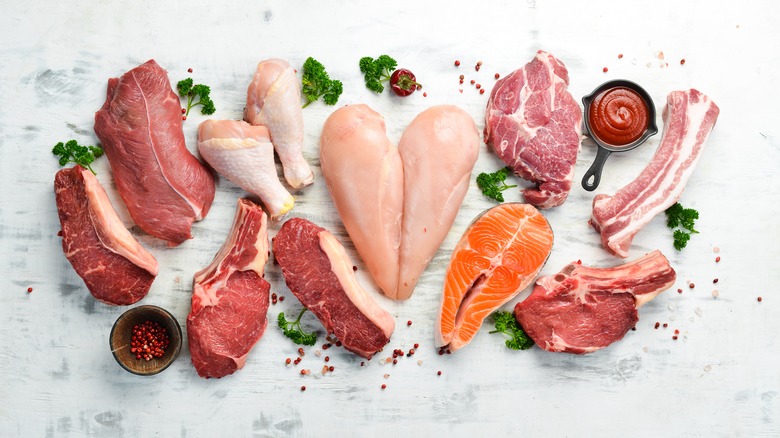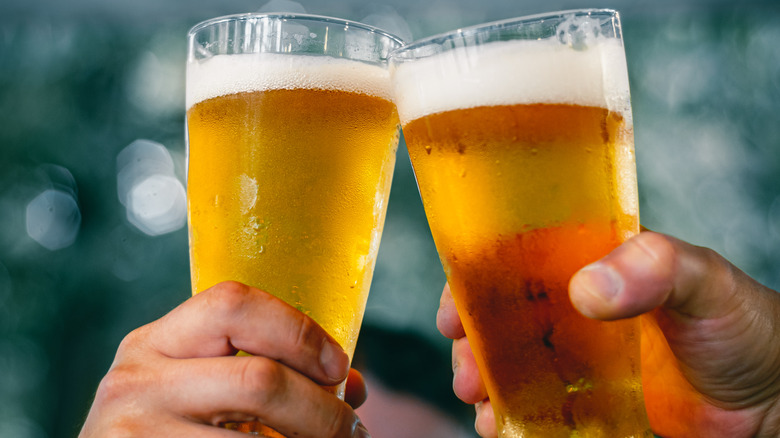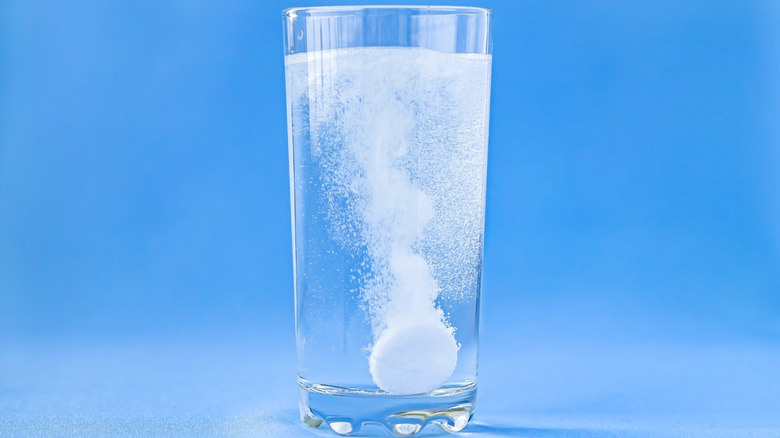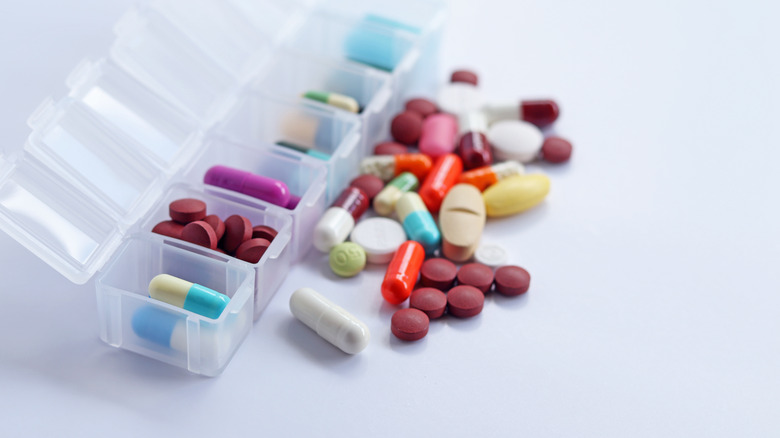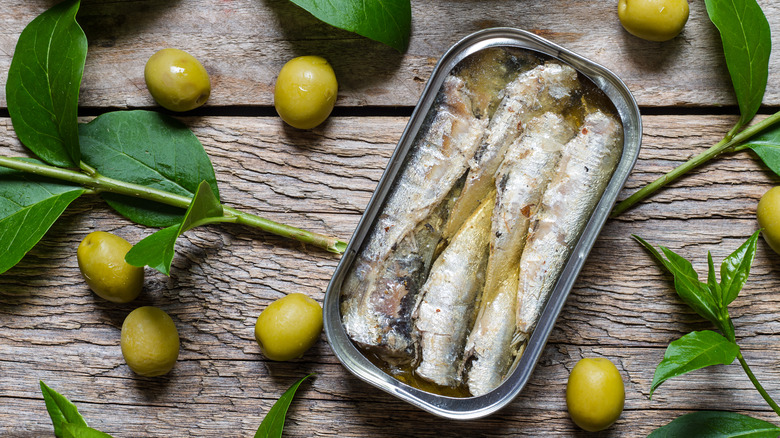Everyday Habits That Can Cause Low Vitamin B12 Levels
It's safe to say all vitamins are important — vital, in fact. They fall under the micronutrient umbrella, meaning our bodies need in small (micro) but steady amounts, per Medical News Today. There are thirteen recognized vitamins, and we require different amounts of each to maintain our health. Having too little or too much of a given vitamin can lead to issues.
Vitamin B12 is one of eight B vitamins and has many fundamental functions in our bodies. For starters, according to the National Institutes of Health (NIH), it helps make all of our cell's genetic material — our DNA. It also keeps our blood and nerves strong and healthy. We don't need that much, just 2.4 micrograms a day for adults. The majority of people get enough from their daily diet — it's found in meat, dairy, seafood, and various fortified products — and our bodies are capable of storing it for years.
If you are running low, though, the symptoms are pretty bothersome and can become dangerous if not remedied. Chronic deficiency can damage the nervous system and has been linked to cancer and heart disease. Low levels of vitamin B12 result from an inadequate intake, or an inability to absorb it properly. Six of your everyday habits may be surreptitiously contributing to either cause.
Common symptoms of low B12
Some symptoms of low vitamin B12 are pretty obvious and will have you picking up the phone to dial your doctor. Others can be insidious and mask as many other common ailments — who isn't tired these days? A deficiency is often overlooked or even misdiagnosed, per Healthline. There are some top signs to keep an eye out for, though, if you suspect you may be running low. First and foremost is that ubiquitous fatigue. Your cells need B12 and if you don't have enough red blood cells, oxygen won't be properly transported throughout your body. This will leave you feeling weak and lethargic.
A more noticeable symptom may be pale, or even yellow-tinged, skin. Anemia and B12 deficiency often go hand-in-hand, thanks to a lack of support for those red blood cells. Vitamin B12 deficiency has also been linked to jaundice.
Tingling hands and feet, known as paresthesia, is also a common symptom of low B12, as are gastrointestinal issues such as diarrhea, constipation, bloating, and gas. Mental health may suffer with symptoms of depression and foggy brain, as B12 affects the central nervous system. One prominent and painful symptom to watch out for is glossitis, which is an inflammation of the tongue, per the NIH.
Vegans and vegetarians may not have sufficient B12 intake
What does, and does not, make it onto your plate is the biggest contributor to your vitamin B12 levels. Vitamin B12 is an essential vitamin, meaning our bodies are not capable of producing it and we must consume it in the food we eat (via foodunfolded). Animal products are the best and main source of the vitamin (per the NIH). Beef liver and clams stand out as two of the food sources highest in B12. Plant foods do not contain any of the vitamin.
Given this, it's probably unsurprising that the leading cause of low vitamin B12 levels is a lack of animal protein in the diet. Those who do not consume sufficient amounts of meat, poultry, dairy, or seafood have a higher chance of developing a deficiency. Vegans and vegetarians are of particular concern — WebMD summarized a study published in The American Journal of Clinical Nutrition that found 92% of vegans as deficient in vitamin B12, and two out of three vegetarians are also running low on the vitamin. Taking supplements or consuming proper amounts via fortified breakfast cereals helps counteract the risk. Nutritional yeast is also a solid non-animal source of the vitamin (via the NIH).
Alcohol interferes with absorption of vitamin B12
That happy hour buzz can often come with undesirable side effects the next morning, but vitamin B12 levels may not be on your radar. If you're worried about your levels, you may want to put down the bottle or visit it less often. There is strong evidence that alcohol interferes with your body's ability to absorb B12. According to Stonegate Center, vitamin deficiency, especially of B vitamins, is very common amongst those with alcohol use disorder.
Your stomach cells secrete a protein called intrinsic factor. Per MedlinePlus, this protein is necessary for vitamin B12 absorption. It binds to the vitamin in your stomach and brings it to your intestines where it's then absorbed into your bloodstream. Without it, this crucial step is compromised. According to a study published in 1990 in the journal Alcohol, alcohol consumption may damage the lining of your stomach, preventing the cells from releasing adequate amounts of intrinsic factor.
And this problem may not be limited to just those who overconsume alcohol. A separate study, published in The European Journal of Clinical Nutrition in 2004, concluded that even moderate consumption of alcohol by healthy, post-menopausal women may lead to lower vitamin B12 levels.
Heartburn medicine can lead to low vitamin B12
A common cause of low vitamin B12 levels is insufficient hydrochloric acid in your stomach. Stomach acid is imperative for breaking down the food we ingest into smaller nutrients, such as vitamin B12, that we can absorb (via Nutritionist Resource).
The main job of popular heartburn medications, like proton-pump inhibitors (PPIs) and antacids, is to suppress stomach acid and relieve the burn. Prolonged use of these medications can lead to chronically low levels of hydrochloric acid. This interferes with the digestion and use of vitamin B12. Indeed, in 2013, The Journal of American Medical Association published a study that found a strong correlation between current and past usage of PPIs and vitamin B12 deficiency.
According to the Cleveland Clinic, low stomach acid can also lead to bacterial overgrowth. Food remains undigested in the small intestine and is a breeding ground for bacteria. This bacteria, known as small intestinal bacterial overgrowth (SIBO), has been linked to inadequate levels of vitamin B12, according to a review published in the American Journal of Gastroenterology.
Cigarette smoking interferes with nutrient absorption and storage
From yellow teeth to stinky breath to cancer, at this point it's common knowledge that cigarette smoking comes with a side of many negative health consequences. It may, however, come as a surprise to hear it has the capacity to diminish your vitamin B12 levels.
In 2013, the Centers for Disease Control and Prevention (CDC) reported that tobacco smokers had lower levels of many nutrients, including vitamin B12. Indeed, a study published in 2016 in Analytical Biochemistry found significantly reduced levels of B12 in the blood serum of habitual smokers compared to non-smokers.
Why is this? For one thing, nicotine is a chemical that impacts the body's ability to absorb nutrients, and possibly drains its stores of vitamins (per Jamaica Hospital). Typically, any excess vitamin B12 is stored in your liver and can remain there for years (via Medline Plus). Smoking also suppresses appetite, which may lead to insufficient consumption of B12-rich foods (via Jamaica Hospital). There are many reasons to crush out those butts, and avoiding a vitamin B12 deficiency can be added to that list.
Various medications and supplements may lower your levels
Several common medications and supplements you may have in your bathroom cabinet can deplete vitamin B12 levels. For instance, vitamin C supplements have been shown to interfere with the absorption of B12 in your digestive system . You may want to think twice if you consume vitamin B12 foods or take all your supplements at the same time. The Mayo Clinic suggests a two-hour window between taking the two supplements, or making sure to consume B12-rich foods to keep your levels safe.
Metformin is a diabetes medication and often the first line of defense doctors prescribe to combat high blood sugar levels. However, a systematic review published in 2016 reported that long-term use of the popular drug may lead to a B12 deficiency by lowering absorption effectiveness in the small intestine (via Diabetes & Metabolism).
Oral contraceptives may contribute to lower levels of B12 as well. A study published in 2013 in the European Review for Medical and Pharmacological Sciences concluded that women who take oral contraceptives are depleted in key nutrients, including vitamin B12. A separate study conducted on over 200 women published in 2003 showed significantly lower levels of the vitamin in women who took oral contraceptives compared to those who did not (via Thrombosis Research).
Your cuppa tea may be a culprit
Caffeinated beverages are diuretics and increase urination (via Clean Eating). This leads to fluid loss, meaning there's less liquid in the body to dissolve water-soluble vitamins such as B12 and allow them to be absorbed into the body (via Colorado State University). And our bodies don't keep and store large quantities of water-soluble vitamins (per Bailey Medical Center) — so it's especially important that our bodies are able to effectively utilize the vitamin B12 we take in daily. In addition, tea also contains tannins which can interfere with the absorption of B12, per Clean Eating.
That said, although coffee is also a diuretic, it has actually been associated with an increased absorption of B12. A review on research findings published in Food Science and Quality Management links this correlation to the stimulating effect coffee has on stomach acid production. In fact, a study published in 2008 in Clinical Chemistry found that healthy middle-aged men and women coffee drinkers had reduced concentrations of B vitamins circulating in their blood, with one exception: vitamin B12.
If you don't handle your stress, your vitamin B12 levels may sink
Stress is a common culprit behind a myriad of health woes. If only solving the root issue were as easy as identifying it — just stress less, right? It's as easy as that, so they say! Among other things, stress takes a terrible toll on our bellies, per Harvard Health Publishing. When the fight-or-flight response is triggered in response to stress, the digestive process can come to a grinding halt. Our bodies want to conserve as much energy as possible to handle the perceived threat. As a result of this function, gastrointestinal issues are a common complaint amongst the burdened.
When this gut-brain stress connection loops continuously, it can lead to chronic gastritis. According to gastroenterologist Wilson P. Pais, speaking to St. Francis Healthcare, "Stress-induced gastritis is well-known." A vitamin B12 deficiency comes into play when this gastritis leads to low secretion of intrinsic factor in the stomach, thus inhibiting absorption, per Johns Hopkins Medicine. While always easier said than done, managing stress is important for the proper absorption of vitamin B12.
High activity levels may deplete B12
Your activity level and intensity of exercise may possibly affect your vitamin B12 levels. A study published in the International Journal of Sport Nutrition and Exercise Metabolism in 2005 found that recreational athletes who engaged in endurance training had an altered metabolism of vitamin B12. The researchers suggest oxidative stress may be the cause. Your body houses both antioxidants and free radicals at all times. When the two become imbalanced, it's known as oxidative stress, per Medical News Today. According to a review published in Nutrients in 2019, oxidative stress is associated with lower levels of vitamin B12 (which has antioxidant properties), though the exact causation isn't yet clear.
Runner's World indicates runners tend to have more nutritional deficiencies, as running depletes the body's stores of vitamins, and cites B12 as one of the most common culprits found at a deficit. Water-soluble vitamins such as B12 are at a risk with intense perspiration, points out Training Peaks. Hardcore exercise periods, hot and humid temperatures, and inadequate water intake may put you at risk of vitamin loss.
Athletes may be in need of more vitamin B12 and should monitor their levels and intake, according to a study published in Nutrients in 2020. Those who do not consume animal products or have low B12 levels to begin with need to take extra care.
Other potential causes of low vitamin B12
There are other factors that can contribute to low vitamin B12 levels in addition to everyday habits. Vitamin B12 deficiency is higher amongst those aged 50 plus. Per The New York Times, as people age, they experience gastric atrophy. This is a reduction in stomach cells that produce acid, which is a crucial factor in breaking down B12 for absorption. It is estimated that 10-30% of adults over 50 produce too little stomach acid.
Digestive disorders can also contribute to low vitamin B12 levels by impairing absorption (via Vitamin B12 Deficiency). Crohn's and celiac are common culprits, as is any surgery done to your digestive system. Gastric bypass surgery for weight loss or surgical re-sectioning to treat Crohn's disease may hinder your ability to absorb B12.
Pernicious anemia — a low red blood cell count due to vitamin B12 malabsorption — is often the first condition physicians will look for when low levels of B12 are detected. Per Medline Plus, pernicious anemia occurs when your body isn't making a certain protein needed for your intestines to absorb B12. Because the body needs B12 to make red blood cells, anemia results.
Top food sources of B12
If you're concerned about any of your everyday habits and if they're diminishing your B12 levels, adding some rich food sources of the vitamin to your diet can help put you at ease.
That tin of sardines collecting dust in your pantry may be worth popping open. WebMD points out one serving of the tiny fish provides over three times the amount of B12 the average person needs. Other fish to catch for the plate, per Healthline, are salmon, tuna, and trout. Just half a filet of salmon has 208% of the Daily Value (DV) of B12. A small 3.5-ounce serving of tuna has a whopping 453%, and trout comes in with 312% for the same size. On land, 3 ounces of ground beef has close to 100% of the DV, and the same amount of turkey meets about half, per Insider. A study published in The Journal of Nutrition way back in 1954 found that organ meats from beef, lamb, and cow are abundant in B12 — the livers and kidneys in particular.
For the plant-based crowd, nutritional yeast is chock full of B12, with just 16 grams of it containing 1,000% of the DV (via Insider). Fortified breakfast cereals, milk, and Greek yogurt will also help you close in on that 100% for the day.

